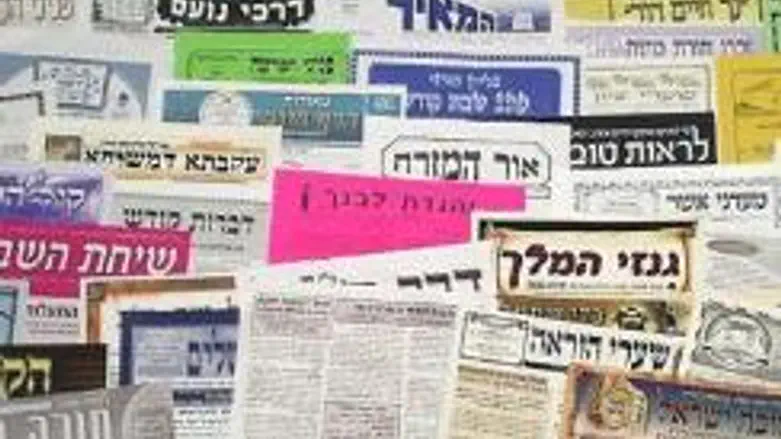
The growing environmental problem caused by the burgeoning quantity of Sabbath Torah sheets and pamphlets may soon find its solution – if the publishers agree to a newly proposed “Green Now” initiative.
In any given synagogue on Friday evening, one can find up to five, 10 or even 15 piles of newly-printed, colorful pamphlets replete with Torah thoughts on the weekly reading, Jewish law and outlook, the Land of Israel, national-religious politics, and more.
Some say that the problem begins right there, when too often worshipers spend their synagogue time “learning” the pages instead of taking active part in the prayer service. But all agree that the problem emerges in full force once the papers are read: What shall be done with them?
The environment will thus gain twice: No added bulk to the genizah loads, and more recycled paper. 
It is common knowledge that words of Torah are not to be thrown in the trash, but must be placed in special “genizah” bins, from where they are taken for burial. However, what was traditionally a free service provided by synagogue sextons and municipalities has now become a luxury. Some cities no longer provide the service; the municipal genizah in Jerusalem, for instance, was recently closed down, and has been replaced by small genizah bins placed throughout the city – chiefly in religious neighborhoods. The charge is generally five shekels for a small bag, and twice as much for a very large one.
The Green Now organization has a different idea. Yish’i Tzviel, the group’s activities coordinator, asked several rabbis for their opinion on the matter, and learned from Rabbi Yaakov Ariel, the Chief Rabbi of Ramat Gan, that not every written Torah thought needs to be placed in genizah. Only if there is a complete verse, or one of the Names of G-d, written on a paper must it be placed in genizah, Rabbi Ariel explained.
Armed with this ruling, Tzviel plans to go to the various publishers of the weekly sheets and pamphlets, and ask them to make sure to adhere to this limitation: No complete verses and no Divine Names. Any publication that commits itself to this rule will be marked by a special Green Now stamp, rendering it “genizah-free.”
But That's Not All
This does not, however, exempt readers from treating the pages with respect, Rabbi Ariel added. “It is not appropriate that words of Torah should be tossed out in the garbage,” he said, “and therefore they must be placed in special recycling bins. The recycling process is effective enough that there is no fear that words of Torah will find themselves ‘replaced’ or over-written; no trace of them remains.”
Rabbi Eliezer Melamed, the rabbi of Har Brachah and Dean of the yeshiva there, is slightly more stringent. "The papers must be placed in special recycling bins to be used again only for Torah literature," he has ruled.
In either event, the environment will thus gain twice: No added bulk to the genizah loads, and more recycled paper. “If everyone takes care of his own pamphlets and sheets and does the simple action of placing them in a recycling bin,” says Tzviel, “tens of thousands more pages can be recycled every week.”